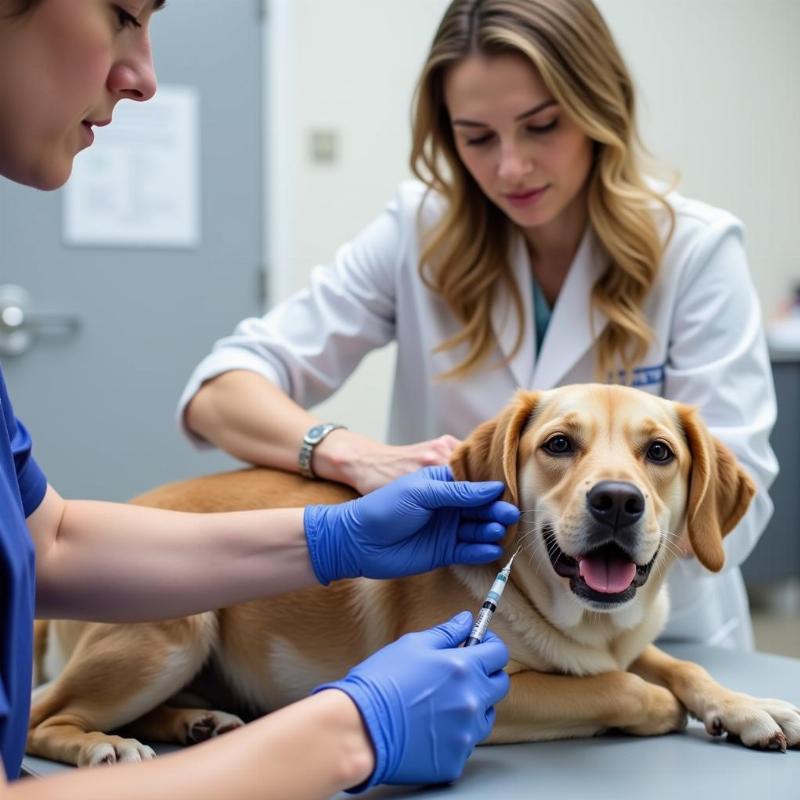Understanding your dog’s blood sugar levels is crucial for their overall health, especially if they’re diabetic or at risk. Knowing what a normal blood sugar range is for dogs, how to recognize signs of trouble, and when to seek veterinary care in the US can make all the difference. “What should a dog’s blood sugar be?” is a common question for concerned pet owners, and we’re here to provide you with the answers.
Maintaining proper blood sugar levels is essential for your dog’s well-being. Just like in humans, consistent high or low blood sugar can lead to serious health complications. This article will explore normal blood sugar ranges for dogs, factors influencing these levels, signs of abnormal blood sugar, testing methods used in the US, and when to contact your veterinarian. We’ll also discuss preventative measures and management strategies for dogs with blood sugar imbalances.
Understanding Normal Blood Sugar Levels in Dogs
A healthy dog’s blood sugar typically ranges from 80 to 120 milligrams per deciliter (mg/dL). This range can fluctuate slightly throughout the day, influenced by factors like diet and activity level. It’s important to remember that individual dogs might have slight variations, and a single reading outside this range doesn’t necessarily indicate a problem. However, persistent readings outside the normal range warrant further investigation by a qualified veterinarian.
Factors Affecting Blood Sugar
Several factors can influence a dog’s blood sugar, including diet, exercise, stress, underlying medical conditions, and medications. For example, a meal high in carbohydrates can cause a temporary spike in blood sugar. Regular exercise, on the other hand, can help regulate blood sugar levels over time. Understanding these factors can help you manage your dog’s blood sugar more effectively.
Recognizing Signs of Abnormal Blood Sugar in Dogs
Being able to recognize the signs of high or low blood sugar in your dog is vital. Common symptoms of high blood sugar (hyperglycemia) include increased thirst, frequent urination, increased appetite, weight loss, and lethargy. Low blood sugar (hypoglycemia) can manifest as weakness, tremors, seizures, collapse, and even loss of consciousness. If your dog displays any of these symptoms, seek immediate veterinary attention. Prompt diagnosis and treatment are critical for managing blood sugar imbalances and preventing long-term complications.
Testing Blood Sugar at Home and at the Vet
In the US, veterinarians typically use a blood test to measure a dog’s blood sugar levels. There are also home glucose monitoring systems available for pet owners who need to regularly monitor their dog’s blood sugar. These systems involve pricking the dog’s ear or lip to obtain a small blood sample. While convenient, it’s essential to discuss using a home monitoring system with your veterinarian to ensure you’re using it correctly and interpreting the results accurately. Regular veterinary check-ups are still necessary to monitor overall health and adjust treatment plans as needed.
When to Contact Your Veterinarian
If your dog consistently exhibits signs of abnormal blood sugar, such as excessive thirst, frequent urination, lethargy, or any other symptoms mentioned earlier, consult your veterinarian immediately. Early diagnosis and treatment are key to managing blood sugar imbalances and preventing potential complications.
Preventing and Managing Blood Sugar Imbalances
Maintaining a healthy weight, providing a balanced diet, and ensuring regular exercise are crucial for preventing blood sugar issues in dogs. For dogs diagnosed with diabetes, regular insulin injections, prescribed by a veterinarian, are often necessary. what should a dogs sugar level be provides more information on this topic. Additionally, working closely with your veterinarian to develop a customized management plan tailored to your dog’s specific needs is essential for successful long-term management.
 Managing Dog Diabetes
Managing Dog Diabetes
Conclusion
Understanding what a dog’s blood sugar should be and recognizing signs of trouble is essential for responsible pet ownership in the US. Regular veterinary check-ups, a healthy lifestyle, and prompt intervention when needed can help ensure your furry friend enjoys a long, healthy life. Remember, early diagnosis and treatment are crucial for managing blood sugar imbalances and preventing serious health complications. Keep a close eye on your dog’s behavior, consult your veterinarian if you notice anything unusual, and prioritize their overall well-being. For further reading on related topics, check out is beet pulp good for dogs and guar gum bad for dogs.
FAQs
- What are the normal blood sugar levels for a dog? A healthy dog’s blood sugar typically ranges from 80 to 120 mg/dL.
- What are the signs of high blood sugar in dogs? Increased thirst, frequent urination, increased appetite, weight loss, and lethargy are common signs.
- What are the signs of low blood sugar in dogs? Weakness, tremors, seizures, collapse, and loss of consciousness can indicate low blood sugar.
- How is blood sugar measured in dogs? Veterinarians use blood tests, and home monitoring systems are also available.
- How can I prevent blood sugar problems in my dog? Maintaining a healthy weight, providing a balanced diet, and ensuring regular exercise are key.
- What should I do if my dog shows signs of abnormal blood sugar? Contact your veterinarian immediately.
- Are there any at-home tests I can use? Yes, but consult with your vet on how to use and interpret them correctly. can bad teeth in dogs cause coughing discusses another important health concern.
Beautdogs.us is your premier resource for dog lifestyle information in the US. We offer expert advice on dog breeds, care, and products, catering to both new and experienced dog owners. are jelly beans okay for dogs offers valuable insights into dog nutrition. Beautdogs.us is committed to providing reliable, comprehensive, and engaging content to help you navigate the world of dog ownership. Contact us today for all your dog-related inquiries: Email: [email protected], Phone: +1 501-555-7529.